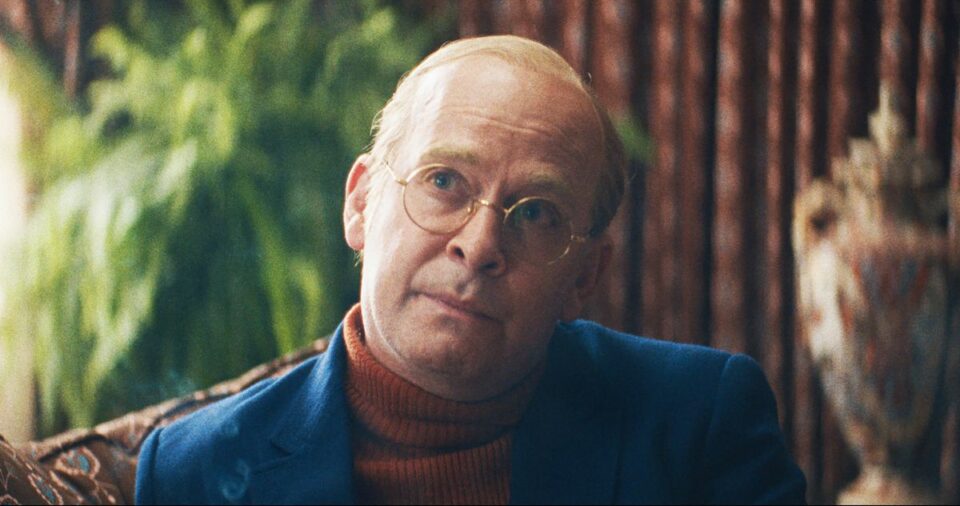It’s an achievement of sorts to make the Black and White Ball, one of Truman Capote’s most infamous society stunts, seem boring. Feud: Capote vs. the Swans devotes a flashback episode to Capote’s 1966 “party of the century” at the Plaza Hotel, where the invitees wore masks, the tablecloths were red, and the guest list included everyone from Andy Warhol to Lynda Bird Johnson. It was the high-water mark for a certain type of American excess, soon looked upon less fondly in light of the war in Vietnam, and a time when the outrageous and aristocratic all got stuffed into the same blender of celebrity — what every Met Ball now wants to be. Feud tackles the spectacle through a black-and-white documentary, invented for the sake of storytelling, in which Capote primps and preps for the ball while stringing along his clique of high-society ladies with the promise that one will be the guest of honor. The show delivers on the cattiness and the glamor and the factoids, like that Capote served everyone spaghetti and chicken hash alongside the champagne. But it misses a deeper insight into why Capote’s guest list was so revolutionary or how ’60s society was shifting as it happened. Feud chooses easier themes. Capote is haunted by the ghost of his mother (Jessica Lange), who monologues in an obvious drawl about her class resentment. (No more storytelling by way of ghosts, please!) Guest of honor Katharine Graham is introduced as an afterthought, a symbol of Capote’s betrayal of his Swans. You’d have to do your own research to learn more about the publisher of the Washington Post.
Seven years after its first season, which tepidly reheated the fights between Joan Crawford and Bette Davis, Ryan Murphy’s anthology series returns to depict a more conceptual battle: Capote adored and was adored by his Swans, these jet-setting, mostly New York women. Then he betrayed them for the sake of art (or perhaps as a way to bite the hands that fed him and commit career suicide; it’s all debatable). In 1975, Esquire published a thinly anonymized excerpt from his planned novel Answered Prayers, “La Côte Basque, 1965,” depicting all his inner circle’s dirty laundry (literally, there’s a passage about a mistress leaving menstrual blood on the upholstery). The Swans, led by the famously gorgeous and stylish “Babe” Paley, iced out Truman in retaliation. His career, already faltering, never recovered. He died in 1984 from liver failure after years of drug and alcohol abuse, Answered Prayers unfinished.
It’s all such rich material, and like many Murphy-produced series, Feud kicks off with a compelling pilot. Capote vs. the Swans is all written by Jon Robin Baitz, playwright and creator of Brothers & Sisters, and mostly directed by Gus Van Sant (Milk, My Private Idaho, and so much more). They make good use of a well-assembled ensemble: Naomi Watts, who always deserves slightly better material than she’s given, brings her mannered fragility to Babe, a woman trapped by the very adoration she generated. Treat Williams, in his last filmed performance as Babe’s philandering husband, CBS head Bill Paley, is both warm and brutally chauvinistic — by far the best work in the show. Like the Swans themselves, Feud features women right on the edge of camp appreciation: Diane Lane delivering the sharpest put-downs as California royalty Slim Keith; Chloë Sevigny giving melancholic WASP royalty as C.Z. Guest; Calista Flockhart digging into the insecurities of Lee Radziwill (sister of Jackie Kennedy); Demi Moore as the unstable Ann Woodward, whom Capote claimed intentionally killed her husband; and Molly Ringwald as the more forgiving West Coast–based Joanne Carson (married to Johnny, for a time). Once Tom Hollander’s Capote starts leaking their secrets in the first episode, you get all the gag-worthy pre-Housewives zingers for which you might have come to the series. Ann leans into Truman and calls him a “venomous little faggot.” Babe refers to him as a “homosexual court jester.” C.Z. lights a cigarette and mutters, “He has a typewriter and you don’t.” Truman dishes right back, announcing to Woodward that “I thought I’d be a fag and show you what a fag can do when he’s angry.”
The mutually predatory conflict between straight women and gay men lies at the heart of this season, and it’s a dynamic well worth hanging a series around, if only the series could get past its surface-level understanding of it. In the last few years, we’ve seen similar inquiries into the ways F-words and hags can use and abuse each other, as in Maestro or The White Lotus or even the mother-son dynamics in All of Us Strangers. Feud depicts some particulars of midcentury gay life — the simultaneous openness and elision the pre-Stonewall closet required — in compelling detail; early on, we see Capote cruising for trade (Russell Tovey) at the Russian Baths and then, disastrously, bringing him to lunch with the Swans. But Feud gets hung up on predictable renderings of conflict. The women are trapped and yet more privileged, and Capote is both their servant and their puppeteer. That’s a true but pat rendering — one that could be, but isn’t, enriched with more specificity.
The later episodes of Feud shift into a more melancholic mode as Capote reflects on what his bitchiness hath wrought — a beat which earns a pause for introspection when one’s livelihood relies on being gay, witty, and mean — but these episodes stall dramatically. Because Feud uses up the one major fissure in this conflict, the publication of “La Côte Basque,” in its premiere, the series jumbles the timeline as it goes forward, coherence unraveling with each passing episode. Hollander, hemmed in by more famous portrayals of Capote, emphasizes Truman’s vocal tics and sashaying flamboyance, delivering a performance that’s compellingly mousy and wounded but misses the opportunity to open more of the character’s vulnerability. Baitz’s writing, to be fair, doesn’t give him much room. The dialogue is never less than right on the nose, especially in one unforgivably clunky episode in which Capote wanders around with fellow gay luminary James Baldwin (in real life, the two were not close) discussing, among other things, whether Capote’s racist. As Baldwin, Chris Chalk does his best with the material, but the set piece comes across all wrong, the characters talking as if they live in 2024 rather than their own era. You lose the sense of real people living within history and instead see a writer commenting from a distance.
It’s shoddy criticism to suggest a piece of art depict what you want rather than what it’s chosen to focus on, but there is simply so much left outside of Capote vs. the Swans’ frame. What, for instance, of Capote’s relationship with Harper Lee? The two grew up together, were heavily involved in each other’s work (as recent scholarship has explored, she was crucial to In Cold Blood), then drifted apart as soon as To Kill a Mockingbird became a best seller. (“I did something Truman could not forgive,” was her line. “I wrote a novel that sold.”) You won’t see that in Feud, but wouldn’t it be an intriguing counterpoint to his dynamic with the Swans? And where is the interest in Capote’s writing itself? When you keep describing writers as predators, you need to explore if the meat is worth it. As slimy as Capote could be, he cut past the skin of society life to show the anatomy inside in a way that Feud never does. Capote vs. the Swans gives us plenty of the surface of Capote, of the public bons mots, but it has trouble getting inside his creative self. There’s a feast to be had in the chaos of Capote’s life, but Feud served chicken hash.
Jackson McHenry , 2024-02-01 20:55:30
Source link


